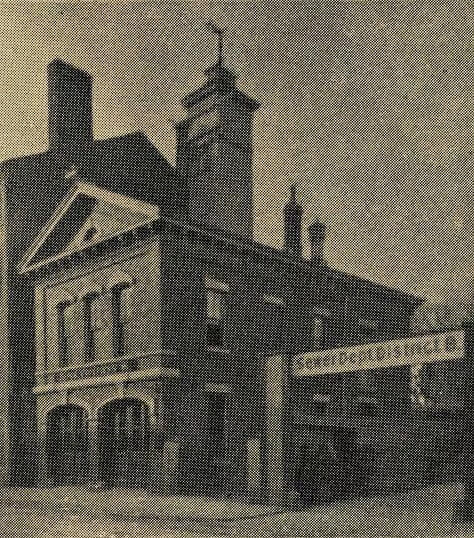Mass General Hospital and a Controversial West End Land Sale in 1931
In 1931, Mayor James Michael Curley planned to sell 50,000 square feet of city land, on North Grove Street in the West End, to Massachusetts General Hospital. Because this land was used by the Public Works Department for sanitation in the West End, residents – and city councilor John I. Fitzgerald – strongly opposed the sale. Fitzgerald, associated with West End boss Martin Lomasney, successfully advocated for the proceeds of the sale to be allocated for continued sanitation services in the West End.
In 1925, Massachusetts General Hospital (MGH) sought to purchase 50,000 square feet of land on the corner of North Grove Street and Fruit Street in the historic West End. More than a century earlier, in 1821, MGH opened its doors in the West End on four acres known as Prince’s Pasture. The hospital adjoined North Grove Street, where the City of Boston’s Public Works Department operated a sanitation facility and horse stables, the latter placed just underneath the hospital windows. Boston residents had been served by a modern sanitation system since 1884, established by city officials to curb waterborne diseases and standardize garbage collection. While West Enders felt that they benefited from a sanitation yard in their neighborhood, Mass General considered the sanitation yard and horse stables to be a great annoyance. MGH leaders, including Dr. Frederick Washburn, complained of the bugs and foul smells, and the noise of sanitation vehicles as they came and left. In June 1925 the hospital’s trustees met with Mayor James Michael Curley to discuss a land sale and ultimate relocation of the Public Works facility. Curley was amenable to the sale, and expected that the sanitation building could be relocated without difficulty. But Curley was no longer mayor after November 1925, due to a limit on consecutive terms, and this likely halted momentum for subsequent discussions. Curley was elected to another non-consecutive term as mayor in 1929, and in 1931 the City Council began hearings on the sale of West End land to MGH.
West End residents, and their city councilor John I. Fitzgerald, were vehemently opposed to the relocation of the Public Works building and the sale of its land to MGH. Michael Karcher, a lawyer from the West End Business Men’s Association, opposed the sale on the basis that West Enders would lose a vital public service while MGH had no definitive plans for how it would use the land. Karcher additionally observed that there was no official record, over the past two decades, of MGH filing complaints about the noise or smell. Councilor Fitzgerald argued that closing the sanitation facility would increase the spread of diseases in the highly dense West End, which depended on unimpeded garbage collection. MGH considered building a home for nurses, which the hospital argued would help create jobs, but Fitzgerald quoted Dr. Washburn himself to prove that MGH had no firm plans for construction. Men and women from Joy St., Mount Vernon St., and other sections of the West End made similar objections. The Boston Globe reported that West Enders were nonetheless willing to accept the sale to MGH so long as services they relied upon, such as garbage collection, would not decline. Fitzgerald strongly insisted that the proceeds of the land sale, at $6/square foot, should be allocated to maintaining adequate sanitation for the West End. The City Council voted 17-3 in favor of the land sale, with Fitzgerald voting against, but his motion for the proceeds to benefit the West End passed without argument.
Fitzgerald’s opposition to Curley on the land sale was considered by contemporaries to reflect an underlying struggle between Curley and Martin Lomasney, the influential political boss of the West End. Lomasney had been at odds with Curley since 1922, when as a state representative he spearheaded a motion for the Attorney General to investigate corruption and financial mismanagement in the Curley administration. During the land sale hearings in 1931, Fitzgerald was perceived as a “Lomasney man” even though Lomasney was largely out of politics by then. Fitzgerald, a lifelong West Ender, delivered papers to Lomasney and supported his political campaigns as a youth; Lomasney then selected Fitzgerald, at eighteen years old, to be the neighborhood’s precinct captain. Councilor Thomas Green felt that the land sale controversy was based on an underlying struggle between Curley and Lomasney, which he wanted no part of. Green abstained from the vote as someone who had supported both men, declaring: “this is a traffic jam, but I do not intend to be squeezed politically.” Other councilors were unconcerned about this political drama in their vote. Francis Kelley, in his “no” vote, expressed, in the Globe’s words, that he “did not know the arguments of the Mayor or Lomasney, but he was going to vote one way or another.” Kelley voted on principle: just as he would never sell off a city playground, he would not sell the sanitation yard.
In 1931, controversial plans to close the West End’s sanitation facility, and sell its land to Massachusetts General Hospital, unearthed long-standing political struggles but also represented West Enders’ legitimate concerns about sustaining the public services they needed for a thriving neighborhood. Soon afterward, Martin Lomasney’s death would leave the neighborhood vulnerable to future incursions, culminating in the West End Project 25 years later.
Article by Adam Tomasi, edited by Bob Potenza.
Sources: ProQuest/Boston Globe (“Hospital Seeks West End Land: Mayor Disposed to Sell to Massachusetts General,” June 22, 1925, page A15; “Lively Opposition to Sale of Land: West Enders Against City Giving Up Yard,” September 26, 1931, page 2; “Council Votes Sale of Yard to Hospital,” October 6, 1931 page 17; “John I. Fitzgerald, Veteran in City, State Politics,” October 25, 1948); West End Museum; UMass Boston; Lomasney Family History










